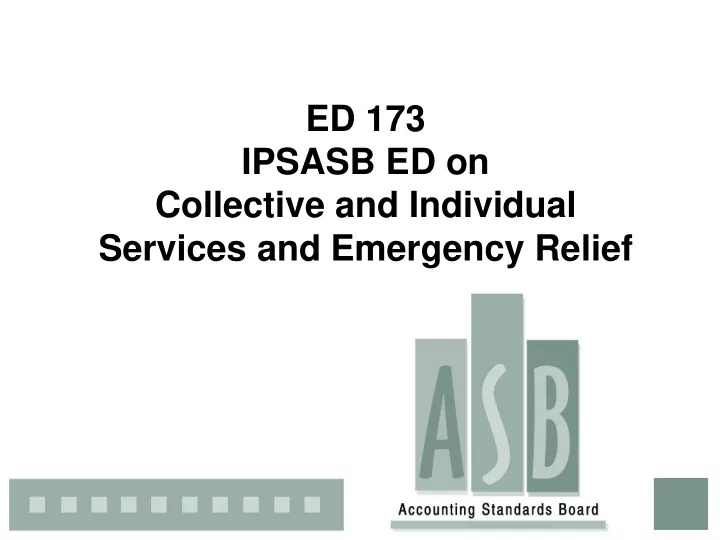

ED 173 IPSASB ED on Collective and Individual Services and Emergency Relief
Disclaimer The views and opinions expressed in this presentation are those of the individual. Official positions of the ASB on accounting matters are determined only after extensive due process and deliberation . 2
Content 1. Background 2. Scope and definitions / descriptions 3. Accounting for Collective and Individual Services 4. Accounting for Emergency Relief 5. Presentation and disclosure 6. Next steps 3
1. Background 4
Background to the project • IPSASB guidance on non-exchange expenses: – Social benefits Non-exchange – Collective & individual services, and expenses emergency relief – Grants, contributions & other transfers 5
Background to the project • IPSASB published to date: 2017 Jan 2019 • Consultation Paper • IPSAS 42 Social on Accounting for Benefits Revenue and Non- • ED 67 (this ED) exchange Expenses 6
2. Scope and definitions / descriptions 7
Scope Source: IPSASB ED 67 At a glance 8
Definitions and description Text of IPSAS 19: • Services provided by a public sector entity simultaneously to all Collective members of the community that services are intended to address the needs of society as a whole • Goods and services provided to individuals and/or households by a Individual public sector entity that are services intended to address the needs of society as a whole 9
Definitions and description (cont.) Source: IPSASB ED 67 10
Definitions and description (cont.) Application Guidance of IPSAS 19: • Governments & other public sector entities may deliver emergency relief to individuals and/or households who have been adversely affected by circumstances not related to social risks, e.g.: a) Natural disasters (flooding, earthquakes, food shortages, volcanic eruptions, etc.); and b) Displacement of individuals and/or households as result of war, civil commotion or economic failure. Not to address needs of society as a whole, but individuals / households 11
SMC 1: Do you agree with the definitions of collective and individual services included in the ED? If not, what changes would you make? 12
3. Accounting for Collective and Individual Services 13
Accounting for Collective Services • Ongoing activities of public sector entity that delivers services • Delivered through exchange transactions • IPSAS 19.26: No provision for costs to continue entity’s ongoing activities in future No provision for entity’s intention to deliver such services Exchange transactions i.a.w. other IPSASs 14
Accounting for Individual Services • Also ongoing activities of public sector entity that delivers services • Acquired through exchange transactions, delivered through non-exchange transactions No provision for entity’s intention to deliver such services Exchange transactions i.a.w. other IPSASs 15
SMC 2 & 3: Do you agree that no provision should be recognised for collective or individual services? If not, under what circumstances do you think a provision would arise? 16
4. Accounting for Emergency Relief 17
Accounting for Emergency Relief In response to As ongoing activity specific of government emergencies • Explicit policy decision • Analogous to collective • Could be “present or individual services -> no provision obligation” • Not analogous • If not, consider -> consider IPSAS 19 for contingent liability provision on contingent • Reassess at each liability reporting date 18
SMC 4: Do you agree with the proposed accounting for emergency relief? If not, how do you think emergency relief should be accounted for? 19
5. Presentation and disclosure 20
Presentation and disclosure • IPSAS 1 and IPSAS 2 • IPSAS 1 nature vs function presentation of expenses 21
Any other general comments? 22
5. Next steps 23
Next steps Upcoming discussions: - 12 March 2019 PSAF - 28 March 2019 roundtables - 29 March 2019 IPSASB event - March / April specific stakeholder engagements Comment deadline: 15 April 2019 24
QUESTIONS? 25
Stakeholder outreach and communication 26
Outreach activities • Continuous promotion of GRAP by improving outreach to stakeholders (workshops, meetings, seminars, SAICA webinars and recordings) • Stakeholders should liaise with ASB when requiring any engagements • Newsletters & Meeting Highlights • Social media • Handbook (order form available on website or on request) 27
Translation • Standards translated into isiZulu, Sesotho and Afrikaans • The official version is the English language version • Available on website 28
Website • Overview of changes made to Standards with effect from 1 April 2019 • Three set of Standards: – Those entities with a December year-end – The Standards applicable for the current year – The Standards applicable for the next financial year • Please register on website if you want to be advised of changes: http://www.asb.co.za/GRAP/Subscribe-to-email-alerts 29
Submitting comments Visit our website for more information on these Exposure Drafts www.asb.co.za Submit your comments to info@asb.co.za 30
THANK YOU 31
Contact details Tel: (011) 697-0660 Fax: (011) 697-0666 Email: info@asb.co.za Website: www.asb.co.za 32
Recommend
More recommend